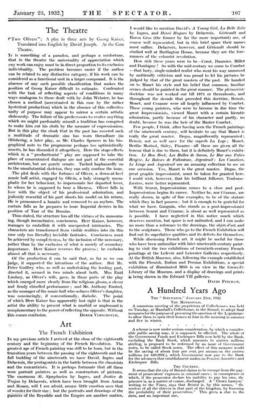The Theatre
fl Two Olivers"; A play in three acts by Georg Kaiser. Translated into English by David Joseph. At the Gate Theatre.
TT is;sornething of a paradox, and perhaps a misfortune, that in the theatre the universality of appreciation which any work can enjoy must be in direct proportion to its exclusive individuality. The problem becomes easier if the author can be related to any distinctive category, if his work can be considered as a functional unit in a larger compound. It is the absence of any such possible classification that makes the position of Georg Kaiser difficult to estimate. Confronted with the task of reflecting aspects of conditions in many ways analogohs to those dealt with by John Webster, he has chosen a method (accentuated in this case by the rather hysterical production) which in the absence of this collective amity. of purpose may appear LO mirror a certain artistic dishonesty. The failure of his predecessors to evolve anything which we might pardonably miscall a tradition has conspired to 'make him cut his cloth by the measure of expressionism. But in this play the cloak that in the past has covered such a ,multitude of dramatic sins has worn threadbare (in Oktobertag, a later play, as Mr. Charles Spencer in his bin- graphical note to the programme perhaps too optimistically asserts, he has discarded it altogether). Here the stage-effects *filch in a " productionist play are supposed to take the place• of concentrated dialogue are not part of the essential architecture, but are purely ornate. Tacked haphazardly on to the unsubstantial skeleton, they can only confuse the issue.
.The -plot deals with the fortunes of Oliver, a down-at-heel musk hall artist, engaged by Olivia, a lady strangely unem- phatic for her behaviour, to impersonate her departed lover, to whom he is supposed to bear a likeness. Oliver falls in love with the object of his professional admiration, and jealouily resentful of his part shoots his model on his return. He is pronounced a lunatic and removed to an asylum. The curtain falls as he prepares to issue Imperial decrees in his position of Tsar of the Russias.
Mils stated, the structure has all the virtues of its unassum- ing,: though inconclusive, conciseness. Herr Kaiser, however, manages to embellish it with unexpected intricacies. The characters are transformed from visible realities into (in this case only too literally) invisible fantasies. Conciseness must be achieved by completeness, by the inclusion of the necessary, rather than by the exclusion of what is merely of secondary importance. Herr Kaiser reverses the process : he excludes almost all that is necessary.
Of the production it can be said that, as far as we can judge, it supported the intentions of the author. But Mr. Peter Godfrey who, as well as undertaking the leading part, directed it, seemed in two minds about both. Miss Enid Lindsey, as 'Oliver's wife, gave, in those parts of the play which emerged more clearly from the religious gloom, a clever and firmly chiselled performance ; and Mr. Anthony Eustrel, as the manager of the music hall who seduces Oliver's daughter, Was convincingly, if conventionally, diabolic. The point of which Herr Kaiser has apparently lost sight is that in the artist the ability to present what is morbid or unpleasant is complementary to the power of reflecting the opposite. Without




































 Previous page
Previous page